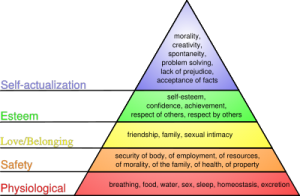Abundance Report: $2 million for a Virtual Horse
World of Warcraft player demonstrate the ultimate level of Abundance, knowingly buying nothing. This is both the ultimate example of Abundance, Artificial Scarcity, and the how to find markets in an age of Abundance.
 Abundance occurs when capacity exceeds needs. This focuses on desires further up Maslow’s hierarchy. Innovation leads to Abundance which drives more innovation.
Abundance occurs when capacity exceeds needs. This focuses on desires further up Maslow’s hierarchy. Innovation leads to Abundance which drives more innovation.
Players of the online game, World of Warcraft, have a lot of free time. They also have a lot of free cash. They were willing to pay $25 for a virtual horse that does not give any benefits other than decoration. 800,000 people rushed to a total of over $2 million in 4 hours for the virtual equivalent of costume jewelry.
Making virtual horses costs nothing. There might be some cost to design the first one but each horse bought by a user is free. The bits used to have a horse in the game versus not having the horse cost exactly the same. This is truly Abundant. But this free item is being sold for $25, how can that be? In the game only people who pay the $25 can have the horse. It’s kept Artificially Scarce. The artificial scarcity is the value of this object. Having something others don’t have and sharing something in common with other people is the desire being satisfied. This is a desire focused on identity. Identity is one of the few things in the universe that is naturally scarce.
Identity will be at the core of successful innovations in an of Abundance.
Abundance Based Intellectual Property System
The intended purpose of intellectual property laws is to promote discovery and encourage sharing of ideas. A system that rewards great discoveries and also makes the realization of the ideas available to as many people as cheaply as possible is the ideal system. Using the concepts of Abundance that system can be achieved.
The patent and copyright system creates artificial scarcity. Its stated goal is to promote the sharing of ideas but it does not work. Its not just broken, it was wrong from the start. It assumes that good ideas are scarce and the only way to get people to share their ideas is to give them a monopoly, creating a temporary scarcity.
It’s absurd to claim information as property. If someone said they owned the number 3 and no one can use it without their permission, they would be laughed at or even locked up for being insane. The patent and copyright system grants ownership to information. That contradicts the goal of promoting discovery and sharing.
Infinite Supply, the Problem with Copyrights & Patents
In a comment to Economics Of Abundance Getting Some Well Deserved Attention a reader complained that there isn’t an infinite supply of good books, good music, and movies. This is flatly false, there’s an infinite supply of any intellectual property and it can be mathematically proven. How is that for being emphatic?
Don’t fear, I’m going to back up that statement and do the following:
- Prove there is an infinite supply of information.
- Show some reasons why Copyrights & Patents are logically flawed.
- List one form of intellectual property that is real and very valuable.
Digital media makes my point very clear. When you digitize a song, book or movie you convert it into numbers. And how many numbers are there? Infinite, you can keep counting forever. Computers store everything as a series of electrical impulses. We think of those as 1’s and 0’s. So inside a computer the music, videos, books and everything else is just a big number.
If you converted the phrase “infinite supply” into a stream of ones and zeros the way the computer sees it this is what it looks like:
01101001 01101110 01100110 01101001 01101110 01101001 01110100 01100101 00100000 01110011 01110101 01110000 01110000 01101100 01111001
As you look at that I’m sure it looks like a meaningless number. And that is the point. That phrase, “infinite supply” is just a meaningless number to a computer. Now look at this article. Up to this point it is 1,462 letters. When I save it on my computer it’s converted to a stream of 1’s and 0’s, it’s just a number. And like every number you could start at 1 and count up to the number equivalent of this article.
To count to the number that represents “infinite supply” you would pass “infinite supplx” and “infinite supplw”. You would also pass “supply”, “infinite”, “finite”, “in” and “a” and every possible combination of letters up to the 15 letter combination that make “infinite supply”. That is 2,954,312,706,550,833,698,643 combinations if we only include the letters “a” through “z” and blank space.
Read more



 Predictive Innovation Training
Predictive Innovation Training Predictive Innovation: Core Skills Book
Predictive Innovation: Core Skills Book RoundSquareTriangle.com
RoundSquareTriangle.com